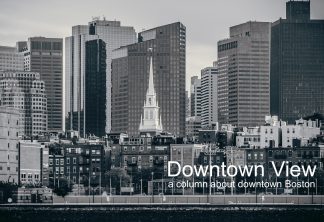 It’s oppressive. You can’t get away from the Trump chaos. Everyone talks about it. Walk down the street, meet a friend. Immediately they bring it up even if you don’t want to hear it. A friend who is skiing in Vermont emailed me about meeting for dinner. But then she ended with, “what’s to become of our nation?”
It’s oppressive. You can’t get away from the Trump chaos. Everyone talks about it. Walk down the street, meet a friend. Immediately they bring it up even if you don’t want to hear it. A friend who is skiing in Vermont emailed me about meeting for dinner. But then she ended with, “what’s to become of our nation?”
A Scottish relative even got into the fray when she took a bus back to Lossiemouth from Elgin. An elderly woman near her told her she pitied the “poor Americans.”
“They niver thought in a the days o man that that absolute fool o a man wid be in the White Hoose,” she said. “And now I hiv tae ging back into Elgin again the night tae join the protest.”
Who knew elderly Scottish ladies would be protesting in far-north Elgin at night?
I try not to think about the nation’s problems unless I hear something funny. Thank goodness for the online Borowitz Report and Stephen Colbert, Jon Stewart, the New Yorker’s Calvin Trillin and Rachel Maddow, whose news is filled with irony and glee at the latest absurdity.
My most successful tactic, however, is to think about banal things instead of scary ones. Taxis come to mind. Life in Boston would be better if we had better taxis. Let’s think about them instead of something else.
Like telephone booths and typewriters, they are a relic of another age. There are the same number of taxi medallions in the city as in past years, according to the media relations department of the Boston Police Department, but there seem to be fewer taxis on the streets. This is hard to verify, however, since no one can tell me how many are actually on the streets.
But taxis don’t have to become relics. They have one advantage over Uber and Lyft. You can stand at a street corner and hail them. And you can find them at taxi stands—the one behind City Hall and in front of 225 Franklin are particularly convenient. If you can find one quickly, they are quicker than Lyft, for whom you have to wait. While taxis are more expensive, it’s usually only a few dollars difference. It won’t break the bank.
But taxis make it hard to love them. Signs pasted on the dirty, clunky divider urge passengers to stay loyal. But who can stay loyal to cramped quarters, no indication that a cab is available when it approaches you, clumsy payment options, hostility if you pay by credit card, annoying blather coming from a small television screen and a lack of air conditioning in the summer?
If taxis are to remain on the streets of Boston, they must up their game. Here are some modest proposals.
Put a light on the top of every cab that says if it is available or not. New York City cabs can manage that simple piece of information. So can DC’s cabs. It’s welcoming and efficient to know that the taxi coming toward you can stop for you.
Get rid of the divider between the driver and the passenger. These were installed long ago after a couple of cab drivers were assaulted. But that occurs rarely. Chicago, Los Angeles and Washington, DC, taxis do not have that bulky barrier that prevents easy exchange with the driver and air conditioning from flowing through. And those places aren’t as safe as Boston.
The unsightly barrier makes it hard for passengers to get in and out and have a place for their feet. A barrier-free ride would make a passenger’s ride more comfortable and make that passenger more inclined to take a taxi rather than Lyft, which is always more comfortable.
Make taxi service regional rather than city-based. Surely if Amazon can figure out how to deliver packages everywhere, some smart person should be able to plan how to deploy cabs all over Boston, Cambridge and Brookline, for starters, with efficiency and standardization. It is annoying to realize that the cab coming toward you near is not supposed to pick you up even if it is empty.
Boston also has its job to do. Taxi medallions are like liquor licenses. They should not be able to be bought and sold in a private market. They should go to one cab and be retrieved when that cab is out of commission. They should be affordable for individual drivers. They should be issued with public comfort and accessibility in mind and not for the benefits and convenience of big owners.
If the taxis don’t make these changes, they’ll descend into the junk yards where Compaq computers and Walkman devices have gone. No one will miss them or be sorry. And we’ll have to go back to thinking about Trump.
Downtown View is a column by newspaperwoman Karen Cord Taylor who founded The Beacon Hill Times in 1995 and served as its editor and publisher until late 2007. She also founded and served as editor and publisher of the Charlestown Patriot-Bridge and The Back Bay Sun weeklies. Karen now works from her home in downtown Boston and blogs at BostonColumn.com. Please feel free to leave responses in the comments section below.




I have 2 things to say:
1) you open up by saying you are tired of hearing about politics then go on for 2 paragraphs about President Trump.
2) I think I speak for everyone when I say that nobody cares about your pal from Scotland and what she thinks.
I wonder how cab drivers would feel about removing the dividers?
The London cab system is wonderful and should be our model. The cabs are clean and spacious and the cabbies are professional and have memorized the city map. The fares are reasonable and consistent.
Karen: Your article was very interesting to me, having taken taxis for many years. The divider makes for an awkward conversation , i.e., explaining directions to driver, and monetary exchange. The roof-top light is a great help….one does not have to waste time waving down a taxi sans light !
Cabs in Boston are a horror show. I remember having to go to the Garden one January for an event. Called for a Cab at 6 PM. I forget what the estimate was. Called at 6:30 PM to see where cab was and did I need to start walking. Answer was, I haven’t been able to get you one. If I had been told that from the start, I would have saved myself the wait time and not frozen walking to the Garden.
So, the same level of expertise on taxis as on other topics. Complain about Trumps’ populism, than offer populist solution to a random issue that has not been a problem.
How about a real problem? Like, who the medallions belong to. How cabs are assigned to drivers. How drivers are completely unqualified to drive or interact with customers. Etc, etc, etc. Though I would suggest writing about typewriters instead. That is a great topic, that even fewer people would have an educated opinion on.
We can’t seem to resolve the simplest of common sense issues locally as we don’t focus on moving forward, or making changes for the greater good. Too much money in the lobbying. Same can be said for Drumpf’s ‘Merica.
You can “try not to think about the nation’s problems” but that’s just sticking your head in the sand. We need to think about it, and protest about it, and rally about it and speak out about it.
Just because here in blue state Massachusetts in the well-off North End things may not be directly impacting you personally – you should think about and care about others !
Scott, perhaps, instead of “We need to think about it, and protest about it, and rally about it and speak out about it.” it should be “we need to mind our own business first” and understand that others might have opinion that is not the same?
More to a point, perhaps we need to perform our everyday tasks, instead of the much easier “chicken little” routine. If you don’t like something, start locally. Pick up garbage from the harbor. Clean up the streets. Plant a flower at Christopher Columbus park. Do something useful, instead of “protesting”.
PS. Not a Trump supporter here. Trying to point to common sense.
Mike this country was founded on protest if it wasn’t for protesters the Vietnam war would still be going on .About cabs when I grew up some NE guys would rent cabs as a second job at North Station.They really had to hussle to try & make a days pay after paying the rental & the gas. Now if you hail a cab in the city your driver will be more likely from Africa or the Middle East it’s a dangerous job like many other others that most Americans refuse to do.
Michael, no problem with protesting. When merited and against something specific that you personally feel should not be going on (Vietnam war was a good example). But what i see around now is a widespread panic with no specific ideas.
I would venture to say that as many people in US opposed Obama in 2008, and for similar reasons (fear of unknown?). I don’t recall this level of protest around the country. I wasn’t in the States in 1980, but curious if Reagan garnered the same level of protests.
The bottom line, in my book, do something useful. Or at least formulate clearly what you are protesting against. The article and Scott’s comment above regarding “thinking about others” are not it. Want to think about others? Go help them directly. That, of course, takes much more time, thought and effort than “protesting”.
I’ll give a local example, if I may. The North End community felt that closing the retirement home is not the right idea. The community protested, while looking for possible solutions and alternatives. You know the end result.
Conversely, the current protests “against everything” very much look like hysterics. What they will accomplish, most likely, is the further tearing of the fabric of the country. What is surprising, that I see absolutely no clear effort towards any sort of mutually acceptable solutions by any side for the last 6-8 years. As a matter of fact it’s gotten significantly worse and more confrontational, if anything. Are we pushing to make it worse, or do we actually have a clear path, not a Utopian one? Again, my though is, “Act locally”. Don’t protest, act.
Mike, I agree if your going to talk the talk you have to walk the walk.